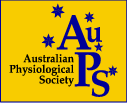

|
| Sunday 25th November 2018 | |||||||
| Law 101 | Law 106 | Carslaw 173 | Anderson Stuart N248 | ||||
| 16:00 |
Registration
Location: Foyer outside Law 101 The registration desk will be open on Sunday from 16:00-18:00 |
||||||
| 16:30 | |||||||
| 17:00 |
AuPS Invited Lecture
|
||||||
| 17:30 | |||||||
| 18:00 |
Welcome Reception
Location: Anderson Stuart Building Courtyard |
||||||
| 18:30 | |||||||
| 19:00 | |||||||
| 19:30 | |||||||
| Monday 26th November 2018 | |||||||||||||||||||||||||||||||||||||||||||||||||||||||||||||
| Law 101 | Law 106 | Carslaw 173 | Anderson Stuart N248 | ||||||||||||||||||||||||||||||||||||||||||||||||||||||||||
| 08:00 |
Registration
Location: Foyer outside Law 101 Registration desk will remain open until 09:00 |
||||||||||||||||||||||||||||||||||||||||||||||||||||||||||||
| 08:30 |
Symposium: Ion channel function
|
Symposium: Shift work: beneficial effects of exercise and the timing of meals
|
Free communications: Exercise physiology
Chairs: Michells Keske & Aaron Petersen
|
||||||||||||||||||||||||||||||||||||||||||||||||||||||||||
| 09:00 | |||||||||||||||||||||||||||||||||||||||||||||||||||||||||||||
| 09:30 | |||||||||||||||||||||||||||||||||||||||||||||||||||||||||||||
| 10:00 | |||||||||||||||||||||||||||||||||||||||||||||||||||||||||||||
| 10:30 | Morning Tea | ||||||||||||||||||||||||||||||||||||||||||||||||||||||||||||
| 11:00 |
Symposium: Metabolic implications of vascular dysfunction Chair: Renée Ross
|
Free communications: Skeletal muscle and disease
Chairs: Bradley Launikonis & Zoe White
|
Free communications: Regulating cellular function
Chairs: Kayte Jenkin & Grigori Rychkov
|
||||||||||||||||||||||||||||||||||||||||||||||||||||||||||
| 11:30 | |||||||||||||||||||||||||||||||||||||||||||||||||||||||||||||
| 12:00 | |||||||||||||||||||||||||||||||||||||||||||||||||||||||||||||
| 12:30 | |||||||||||||||||||||||||||||||||||||||||||||||||||||||||||||
| 13:00 |
Lunch and posters
|
||||||||||||||||||||||||||||||||||||||||||||||||||||||||||||
| 13:30 | |||||||||||||||||||||||||||||||||||||||||||||||||||||||||||||
| 14:00 | Posters | ||||||||||||||||||||||||||||||||||||||||||||||||||||||||||||
| 14:30 | |||||||||||||||||||||||||||||||||||||||||||||||||||||||||||||
| 15:00 | Afternoon Tea | ||||||||||||||||||||||||||||||||||||||||||||||||||||||||||||
| 15:30 |
Symposium: Metabolic and signalling dysregulation in cardiac stress Chair: Kim Mellor
|
Free communications: Skeletal muscle and metabolism
Chairs: Adam Rose & Kirsten Howlett
|
|||||||||||||||||||||||||||||||||||||||||||||||||||||||||||
| 16:00 | |||||||||||||||||||||||||||||||||||||||||||||||||||||||||||||
| 16:30 | |||||||||||||||||||||||||||||||||||||||||||||||||||||||||||||
| 17:00 | |||||||||||||||||||||||||||||||||||||||||||||||||||||||||||||
| 17:30 | ECR talk | ||||||||||||||||||||||||||||||||||||||||||||||||||||||||||||
| 18:00 | |||||||||||||||||||||||||||||||||||||||||||||||||||||||||||||
| 18:30 |
Student/ECR mixer
Location: The Rose Hotel, Chippendale |
||||||||||||||||||||||||||||||||||||||||||||||||||||||||||||
| 19:00 | |||||||||||||||||||||||||||||||||||||||||||||||||||||||||||||
| 19:30 | |||||||||||||||||||||||||||||||||||||||||||||||||||||||||||||
| Tuesday 27th November 2018 | |||||||||||||||||||||||||||||||||||||||||||||||||
| Law 101 | Law 106 | Carslaw 173 | Anderson Stuart N248 | ||||||||||||||||||||||||||||||||||||||||||||||
| 08:00 |
Registration
Location: Foyer outside Law 101 Registration desk will remain open until 09:00 |
||||||||||||||||||||||||||||||||||||||||||||||||
| 08:30 |
Symposium: The genome and epigenome of the exercising skeletal muscle Chair: Nir Eynon
|
Free communications: Cardiac physiology
Chairs: James Hudson & Richard Mills
|
Free communications: Neural mechanisms
Chair: Gary Housley
|
||||||||||||||||||||||||||||||||||||||||||||||
| 09:00 | |||||||||||||||||||||||||||||||||||||||||||||||||
| 09:30 | |||||||||||||||||||||||||||||||||||||||||||||||||
| 10:00 | |||||||||||||||||||||||||||||||||||||||||||||||||
| 10:30 | Morning Tea | ||||||||||||||||||||||||||||||||||||||||||||||||
| 11:00 |
Symposium: The structural basis of electrical signalling: latest developments in the structural analysis of ion channels and transporters
|
Symposium: Maternal Influences on fetal physiology
|
|||||||||||||||||||||||||||||||||||||||||||||||
| 11:30 | |||||||||||||||||||||||||||||||||||||||||||||||||
| 12:00 | |||||||||||||||||||||||||||||||||||||||||||||||||
| 12:30 | |||||||||||||||||||||||||||||||||||||||||||||||||
| 13:00 | Lunch | ||||||||||||||||||||||||||||||||||||||||||||||||
| 13:30 | |||||||||||||||||||||||||||||||||||||||||||||||||
| 14:00 |
Plenary Lecture
|
||||||||||||||||||||||||||||||||||||||||||||||||
| 14:30 | |||||||||||||||||||||||||||||||||||||||||||||||||
| 15:00 | Afternoon Tea | ||||||||||||||||||||||||||||||||||||||||||||||||
| 15:30 |
Symposium: Rigor and reproducibility in physiological research Chairs: Bill Phillips & Séverine Lamon
|
||||||||||||||||||||||||||||||||||||||||||||||||
| 16:00 | |||||||||||||||||||||||||||||||||||||||||||||||||
| 16:30 | |||||||||||||||||||||||||||||||||||||||||||||||||
| 17:00 | |||||||||||||||||||||||||||||||||||||||||||||||||
| 17:30 | |||||||||||||||||||||||||||||||||||||||||||||||||
| 18:00 | |||||||||||||||||||||||||||||||||||||||||||||||||
| 18:30 | |||||||||||||||||||||||||||||||||||||||||||||||||
| 19:00 |
Conference Dinner
Location: Dockside. Cockle Bay Wharf, Wheat Rd, Darling Harbour Drinks served at 19:00 before dinner at 19:30. Doors close at 23:30. |
||||||||||||||||||||||||||||||||||||||||||||||||
| 19:30 | |||||||||||||||||||||||||||||||||||||||||||||||||
| 20:00 | |||||||||||||||||||||||||||||||||||||||||||||||||
| 20:30 | |||||||||||||||||||||||||||||||||||||||||||||||||
| 21:00 | |||||||||||||||||||||||||||||||||||||||||||||||||
| 21:30 | |||||||||||||||||||||||||||||||||||||||||||||||||
| 22:00 | |||||||||||||||||||||||||||||||||||||||||||||||||
| 22:30 | |||||||||||||||||||||||||||||||||||||||||||||||||
| 23:00 | |||||||||||||||||||||||||||||||||||||||||||||||||
| Wednesday 28th November 2018 | |||||||||||||||||||||||||||||||||||||
| Law 101 | Law 106 | Carslaw 173 | Anderson Stuart N248 | ||||||||||||||||||||||||||||||||||
| 08:00 |
Registration
Location: Foyer outside Law 101 Registration desk will remain open until 09:00 |
||||||||||||||||||||||||||||||||||||
| 08:30 |
Symposium: Enhancing student engagement: flipping, quizzes, study tools, condensed units and professional development Chairs: Julia Choate & Yvonne Hodgson
|
Symposium: Immunometabolism and disease
|
|||||||||||||||||||||||||||||||||||
| 09:00 | |||||||||||||||||||||||||||||||||||||
| 09:30 | |||||||||||||||||||||||||||||||||||||
| 10:00 | |||||||||||||||||||||||||||||||||||||
| 10:30 | Morning Tea | ||||||||||||||||||||||||||||||||||||
| 11:00 |
Symposium: Adipose tissue - physiology and pathology Chair: Lea Delbridge
|
Education free communications
|
|||||||||||||||||||||||||||||||||||
| 11:30 | |||||||||||||||||||||||||||||||||||||
| 12:00 | |||||||||||||||||||||||||||||||||||||
| 12:30 | |||||||||||||||||||||||||||||||||||||
| 13:00 | Lunch | ||||||||||||||||||||||||||||||||||||
| 13:30 |
Michael Roberts Lecture
|
||||||||||||||||||||||||||||||||||||
| 14:00 | AGM and award of prizes | ||||||||||||||||||||||||||||||||||||
| 14:30 | |||||||||||||||||||||||||||||||||||||
| 15:00 |
Education Workshop - MCQs and SAQs in Australian Physiology Education
Chairs: Julia Choate & Andrew Moorhouse |
||||||||||||||||||||||||||||||||||||
| 15:30 | |||||||||||||||||||||||||||||||||||||
| 16:00 | |||||||||||||||||||||||||||||||||||||
| 16:30 | |||||||||||||||||||||||||||||||||||||
| 17:00 | End of Meeting | ||||||||||||||||||||||||||||||||||||
Administration access - requires authorisation
|
Copyright © 1996-2025 AuPS Inc. Last updated 7 April 2025.
Comments or questions on the content of this site should be directed to the Secretary, AuPS. Technical problems should be referred to the Webmaster Privacy Policy |

|